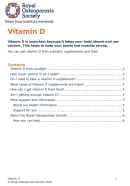You can now add Healthify as a preferred source on Google. Click here to see us when you search Google.
Colecalciferol
Sounds like 'koh-lee-kal-sif-er-ol'
Key points about colecalciferol
- Colecalciferol is a vitamin D supplement.
- Colecalciferol is also known as vitamin D3.
- It's also included in medicines such as Fosamax Plus®.
- Find out how to take it safely and possible side effects.

Colecalciferol is a vitamin D supplement. The information on this page is about Vitamin D capsules (1.25 mg ) for adults that you can get from a prescriber.
It's prescribed if you have low vitamin D levels. Vitamin D is important for the absorption of calcium from your stomach and for the functioning of calcium in your body.
- A mild lack of vitamin D may not cause symptoms, but it can cause general aches and pains.
- An ongoing lack of vitamin D can increase your risk of weak, brittle bones and osteoporosis.
Colecalciferol works by helping your body absorb more calcium from your diet.
In Aotearoa New Zealand, colecalciferol is available in the following forms:
- Soft gelatin capsules (1.25 mg) available on prescription written by a prescriber.
- A liquid. Read more about vitamin D supplements for babies.
- Capsules that you can buy over the counter at a supermarket, health shop or pharmacy. Read more about whether you need a vitamin D supplement.
Note: Colecalciferol is also available in combination with the medicine alendronate. It's also commonly called Fosamax Plus®. The amount of colecalciferol is less in this combination tablet. These tablets are taken once weekly for osteoporosis. Read more about alendronate plus vitamin D.
Vitamin D is produced naturally in your body when your skin is exposed to sunlight. Most people get enough vitamin D this way. A small amount of vitamin D comes from foods such as oily fish (salmon, mackerel, tuna), eggs, margarine and some milk.
- In Aotearoa New Zealand, vitamin D levels are lowest during winter.
- Females tend to have lower vitamin D levels than males.
- People over the age of 70 years, particularly those in residential care, are exposed to less sunshine and have a reduced ability to make vitamin D.
- Māori and Pacific Peoples have lower levels of vitamin D than Pakeha or Europeans people.
- People with darker skin, such as Africans and Indians, are likely to have lower levels of vitamin D.
- People who are obese have lower levels of vitamin D than others.
Most people don't have their vitamin D level checked and can start a vitamin D supplement safely without having a blood test. If you're at higher risk of being vitamin D deficient (not getting enough vitamin D), your healthcare provider will assess your risk and may prescribe colecalciferol.
Read more about vitamin D and whether you need a vitamin D supplement.
Pregnancy
If you're pregnant and have a combination of risk factors for vitamin D deficiency (eg, being pregnant over winter, having darker skin and living in the South Island) it's recommended you have your vitamin D levels tested.
Read more about the risk of vitamin D deficiency in pregnancy and pregnancy and vitamin D.
- Always take your colecalciferol exactly as your healthcare provider has told you. The pharmacy label on your medicine will tell you how much to take, how often to take it and any special instructions.
- The usual dose of prescribed colecalciferol in adults is 1 capsule (1.25 mg) once a month.
- Another common way of measuring doses of vitamins is in international units (IU). 1.25 mg of vitamin D is the same as 50 000 international units (IU).
- You may be asked to take 2 capsules as your first dose, followed by 1 capsule every month after that.
- Some people who have very low vitamin D may need higher doses, such as 1 capsule once a day for 10 days, followed by 1 capsule every month thereafter. If you have deficiency from liver disease you may need to continue to take a capsule daily.
- Take it regularly: If you have been advised to take colecalciferol once a month, choose a date that's easy for you to remember and mark it on the calendar, such as the first or last day of each month.
- Food: Colecalciferol can be taken with or without food.
- Missed dose: If you forget to take your dose, take it as soon as you remember, even if it's a few days later. But, if it's nearly the day for your next dose, just take the next dose on your usual day. Don't double the dose.
Here are some things to know when you're taking colecalciferol. Other things may be important as well, so ask your healthcare provider what you should know about.
- Peanut or soy allergy: Vit.D3 contains soya oil inside the capsule. Some people are allergic to soya oil and some people with peanut allergy also react to soya oil. The soft gelatin capsule should not be taken by people who are allergic to peanut or soya.
- Other medicines: Some health supplements, multivitamin products and calcium supplements may also contain vitamin D, so check with your healthcare provider or pharmacist before starting colecalciferol and before starting any new supplements.
- Calcium: Your healthcare provider may also advise you to have plenty of calcium in your diet. Good food sources of vitamin D are tuna, oily fish, eg, tuna, salmon and sardines, eggs, full-fat milk, yoghurt and cheese.
- Pregnancy or breastfeeding: Talk to your healthcare provider if you're pregnant, planning a pregnancy or want to breastfeed.
- Monitoring: You don't need to have your vitamin D levels checked while taking colecalciferol because it's safe to take without regular blood tests.
Peanut and soy allergy
Colecalciferol soft gelatin capsules contain soybean oil. Some medicines containing soybean oil might cause an allergic reaction in patients with a peanut or soy allergy. If you have a peanut or soy allergy, ensure that your healthcare provider or pharmacist is aware of this and ask them to check your medicines. Learn more by reading the Medsafe safety information(external link).
Other side effects
Like all medicines, colecalciferol can cause side effects, although not everyone gets them. If you're concerned about any symptoms you think might be related to your medicine, talk to your healthcare provider. The following information offers some guidance but doesn't include all possible side effects.
Tell your healthcare provider immediately or phone Healthline free on 0800 611 116 if these occur
-
Signs of too much vitamin D, such as a sore tummy, headache, confusion, dry mouth, irregular heartbeat, muscle pain, increased thirst, decreased appetite, nausea (feeling sick), vomiting (being sick), diarrhoea (runny poo), increased sweating.
Phone 111 for an ambulance or go to your nearest accident and emergency (A&E) clinic if these occur
- Signs of an allergic reaction such as:
- an itchy sensation inside your mouth, throat or ears
- a raised itchy red rash
- swelling of your face around your eyes, lips, tongue and roof of your mouth
- problems breathing, like a tight chest or shortness of breath
- vomiting (being sick).
Read more about medicines and side effects and reporting a reaction you think might be a side effect.
The following links provide further information on colecalciferol:
Colecalciferol(external link) New Zealand Formulary Patient Information
Brochures
Medicines and side effects(external link) Healthify He Puna Waiora, NZ, 2024
Vitamin D supplements and tests(external link) Royal Osteoporosis Society, UK, 2025
5 questions to ask about your medications(external link)(external link)(external link) Health Quality and Safety Commission, NZ, 2019 English(external link), te reo Māori(external link)
References
- Colecalciferol(external link) New Zealand Formulary
- Vitamin D(external link) New Zealand Formulary
- Vitamin D supplementation – an update(external link) BPAC, NZ, 2025
- Vit D3(external link) Medsafe datasheet, NZ
- Companion statement on vitamin D and sun exposure in pregnancy and infancy in New Zealand(external link) Health New Zealand | Te Whatu Ora, NZ, 2024
- Vit.D3 – important information for patients with a peanut or soya allergy(external link) Medsafe, NZ, 2016
Vitamin D supplementation B-QuiCK(external link) BPAC, NZ, 2025
Vitamin D supplementation – an update(external link) BPAC, NZ, 2025 (full article)
Medicine-induced hyponatraemia: increased risks in older people(external link) Medsafe, NZ, 2024
Brochures

Medicines and side effects
Healthify He Puna Waiora, NZ, 2024

Vitamin D supplements and tests
Royal Osteoporosis Society, UK, 2025

Health Quality and Safety Commission, NZ, 2019 English, te reo Māori
Credits: Healthify editorial team. Healthify is brought to you by Health Navigator Charitable Trust.
Reviewed by: Stephanie Yee, Pharmacist, Auckland.
Last reviewed:





